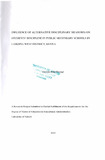| dc.description.abstract | The study was postulated from the fact that cases of students' violence and unrest leading to loss of life and property continue being experienced in secondary schools. The main study objectives were; To determine the influence of guidance and counseling on students discipline in public secondary schools; to examine the role of school rules and regulations in managing discipline among students in public secondary schools; to establish the influence of student's participation in setting out school rules and regulations on students' discipline in public secondary schools; to establish the influence of use of rewards on students' discipline in public secondary schools and to seek the opinions of school administrators and students on alternative measures of managing students' discipline. The literature reviewed included the concept of discipline and punishment, importance of discipline among students, corporal punishment, approaches to enforcement of discipline such as guidance and counseling, use of school rules and regulations and students' participation in school management.
The study adopted a descriptive research design. The study targeted a total population of 20 principals from 20 secondary schools in Laikipia West District, 112 teachers and 351 students where 87.4 percent return rate was realized using both closed and open ended items. The study findings from the principal indicated that; counseling programme enhance students discipline through building courage and moral uprightness thereby inculcating good value and positive attitude towards the development of self discipline that enhances behavior change. About 84 percent of the principals either agreed or strongly agreed that rules and regulations influence students discipline in schools, supported by 66 percent of the teachers and 63 percent of the students.
The principals indicated that students often participate in career choices, selection of optional subjects, electing their leaders and a hearing before they are punished. The findings indicate that students occasionally participate in making of the policies that affect their conduct and behavior in the school. Both dialogue and punishment are the most popular reward systems used to influence discipline in schools. Finally, encouraging the formation of student representations, students 'baraza' and introduction of student council to and motivating exemplary student leaders inculcates leadership responsibilities, thus promoting respect and good student teacher interactions. Other strategies include strengthening and building capacity through recruitment, allocating adequate budget to guidance and counseling programme, formation and empowerment of a student's disciplinary bodies.
The study recommends that, there is need for Teachers Service Commission (TSC) to post adequate teachers to schools and the school management to train and empower guidance and counseling teachers to improve the effectiveness of alternative disciplinary measures. The study suggest the following areas for further research: The influence of budgetary allocation on guidance and counseling programmes in schools; effectiveness of clubs and peer educators in enhancing student discipline in schools; the influence of parental guidance and counseling on students discipline in schools; the impact of discipline on student Kenya certificate of secondary education (KCSE) perfonnance. | en_US |

